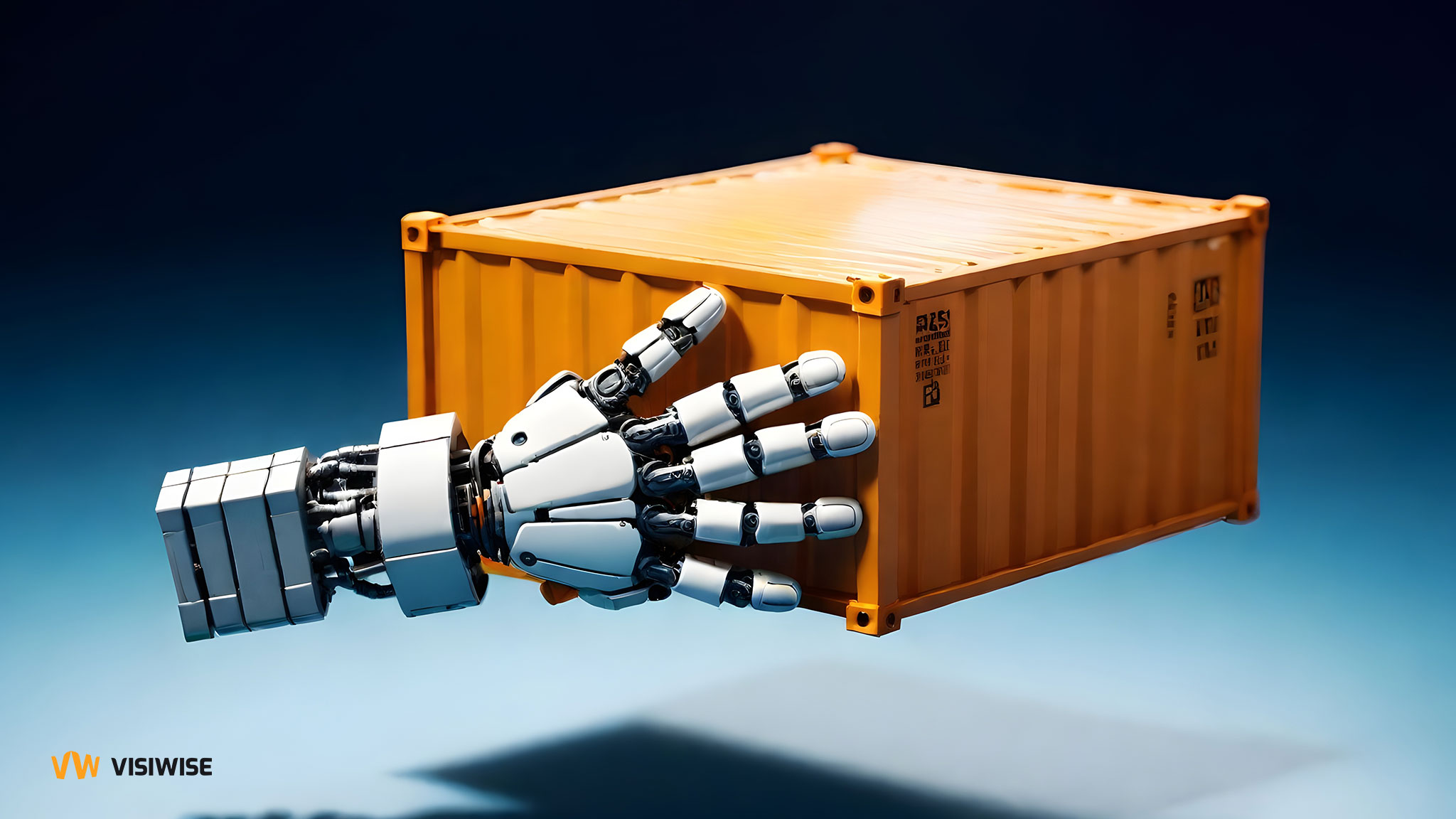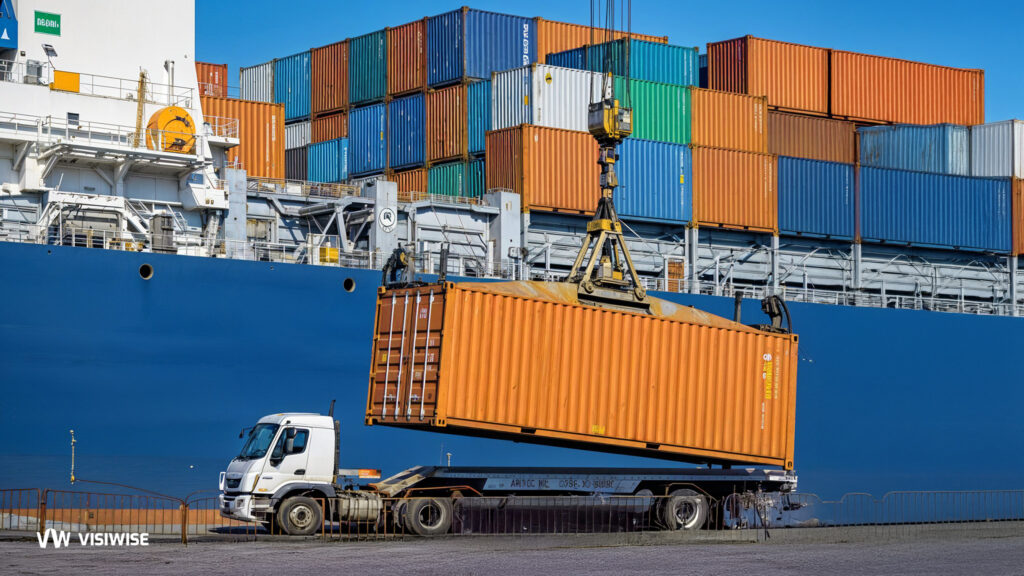In today’s fiercely competitive global market, logistics operations are under immense pressure to deliver speed and reliability.
Customer service lies at the heart of the modern logistics system, characterized by the prompt, reliable, and precise delivery of goods in pristine condition.
Traditional logistics practices are undergoing a significant overhaul propelled by technological advancements, compelling supply chain leaders to evolve. Among these transformative technologies, machine learning stands out.
Machine learning empowers logistics service providers to sift through extensive data sets, enhancing logistics management practices. As a prevalent subset of artificial intelligence (AI), machine learning is swiftly being embraced by businesses worldwide to revolutionize various operational facets.
This digital transformation is reshaping the landscape, with goods, services, and workplaces integrating machine learning to streamline, automate, and enhance their operations.
Key Statistics:
- The Global AI Market is forecasted to generate a revenue of $118 billion by 2025, as reported by Tractica, a renowned market research organization.
- Amazon employs a machine learning algorithm to automate the picking and packing process within warehouse logistics. This implementation resulted in a remarkable 225% reduction in Amazon’s average ‘click to ship’ time, from 60-75 minutes to just 15 minutes, as highlighted by Forbes.
- Currently, 91% of leading businesses are actively investing in AI, according to Businesswire.
- Research conducted by McKinsey reveals that 44% of organizations have successfully reduced their business costs through the integration of AI.
- Microsoft’s Azure Machine Learning framework boasts a 62% accuracy rate in predicting stock market peaks and troughs.
- McKinsey’s findings suggest that the implementation of AI has enabled companies to enhance various aspects of their logistics operations: reducing logistics costs by 15%, optimizing inventory levels by 35%, and boosting service levels by 65%.
Key Insights:
- Machine Learning (ML), a subset of Artificial Intelligence (AI), revolutionizes logistics through precise data-driven predictions.
- McKinsey reports that AI-driven supply chains can yield significant cost reductions (15%), inventory optimization (35%), and efficiency improvements (65%).
- Integration of machine learning in logistics enables intelligent analysis of large datasets, enhancing route planning, inventory management, and demand forecasting.
- As automation technologies evolve, the logistics industry undergoes substantial changes, with machine learning playing a crucial role in optimizing deliveries for transportation companies.
- The COVID-19 pandemic has permanently altered consumer behavior, necessitating logistics businesses to adapt to new expectations for accurate, fast, and cost-effective delivery, with real-time tracking becoming standard.
Survey Findings: Implementing Machine Learning in Logistics
Logistics companies are increasingly turning to artificial intelligence (AI) and machine learning (ML) for advanced data analytics, aiming to enhance efficiency and customer satisfaction. Gartner predicts that by leveraging AI-based software with progressive analytics capabilities, 50% of supply chain business operations will be optimized.
Machine-learning-powered software facilitates automated route planning and more accurate demand forecasting, leading to cost reductions and operational enhancements. Results from a McKinsey survey highlight that companies experienced a 15% improvement in logistics costs following the implementation of automation technologies.
Machine Learning Market Growth: Transforming Business Efficiency
Machine learning (ML), a subset of artificial intelligence (AI), plays a crucial role in processing and organizing vast amounts of data to provide businesses with actionable insights for performance enhancement.
The global machine learning market reached a valuation of $38.11 billion in 2022. Projections indicate a significant expansion, with forecasts anticipating a market value of $771.38 billion by 2032. This represents a remarkable compound annual growth rate (CAGR) of 35.09% from 2023 to 2032.
The convergence of machine learning and supply chain management revolutionizes transportation business efficiency, particularly in automation and demand forecasting. Recognized as one of the top trends in logistics technology, ML technology extracts valuable insights from route optimization, inventory management, security, and risk assessment records.
Leveraging Machine Learning for Streamlined Logistics Operations: Fundamentals of Automation
Machine learning and AI practices tailored for logistics focus on optimizing the following key areas:
- Demand Forecasting: ML algorithms leverage historical data, market trends, and external factors to enhance demand forecasting accuracy, mitigating inventory shortages and surpluses.
- Route Optimization: ML dynamically optimizes delivery routes considering factors such as traffic, weather, and delivery windows in real-time, thereby reducing fuel consumption and delivery lead times.
- Inventory Management: ML models predict optimal inventory levels and reorder points, minimizing carrying costs while ensuring sufficient stock availability.
- Predictive Maintenance: ML monitors equipment and vehicles, forecasting maintenance requirements based on usage patterns, thereby reducing downtime and maintenance expenses.
- Warehouse Management: ML-driven warehouse optimization improves layout design, product placement, and picking strategies, thereby reducing fulfillment times and operational costs.
- Quality Control: ML algorithms detect defects and anomalies in real-time during manufacturing and shipping processes, ensuring product quality and reducing waste.
- Last-Mile Delivery: Machine learning optimizes last-mile delivery by considering variables such as delivery windows, traffic conditions, and package characteristics, thereby enhancing customer satisfaction.
- Risk Management: ML assesses supply chain risks by analyzing incident data from diverse sources, enabling proactive risk mitigation strategies to be implemented.
- Sustainability: ML-driven optimization of logistics processes, including route planning and vehicle allocation, helps reduce carbon emissions, contributing to more environmentally friendly operations.
Key Benefits of Implementing Machine Learning in Supply Chain Operations
In transportation, operational efficiency relies as much on logistics data as it does on physical assets. From routing performance to inventory and load tracking, every supply chain operator manages vast amounts of data to drive further growth.
Utilizing machine learning in supply chain management offers businesses the opportunity to reimagine routine tasks with the following advantages:
Enhanced Efficiency
Machine learning’s popularity in the logistics industry stems from its capability to anticipate potential disruptions. It enables logistics businesses to mitigate risks associated with human factors by leveraging automatically collected and intelligently processed data.
Once ML-powered software identifies performance patterns, the system develops algorithms to minimize risks and optimize operations. With shipments monitored in real-time and routes automatically adjusted, companies can unlock the full potential of their assets and fleet.
Cost Reduction
Real-time visibility platforms, fueled by data analytics, enable logistics businesses to optimize route planning based on current traffic and weather conditions. By analyzing real-time traffic data, these platforms generate the most efficient routes, thereby eliminating financial losses associated with delays and inefficiencies. Additionally, they provide insights that enable proactive decision-making, leading to further cost reductions across the transportation network.
Enhanced Customer Experience
Machine learning in supply chain management significantly enhances customer satisfaction by offering features such as real-time parcel tracking, automatic load notifications, and timely delivery. These capabilities bolster your reputation and elevate the overall customer experience.
Better Decision-Making
Utilizing machine learning enables supply chain optimization models to continuously learn from analyzed data. Through mathematical algorithms, it identifies patterns, detects demand signals, and establishes correlations within extensive datasets. This intelligent system efficiently handles large volumes of data, providing logistics operators with market-relevant insights for effective planning.
Scalability and Adaptability
Machine learning’s ability to automatically process large volumes of data enhances your business’s adaptability to the ever-changing market. With diverse use cases tailored to your company’s needs, customizing machine learning models becomes essential, especially for larger fleets planning to expand their ML applications.
Environmental Impact
Machine learning minimizes waste through accurate demand forecasting, resulting in reduced warehouse energy consumption and promoting sustainable sourcing practices. Additionally, it aids in tracking and reporting carbon emissions, integrating renewable energy sources, and identifying recycling opportunities, thereby contributing to eco-friendly practices throughout the supply chain.
Applications of Machine Learning in Supply Chain and Logistics
The range of potential machine learning applications in logistics is diverse, tailored to the specific needs and scale of operations. Larger enterprises may benefit from automation in fleet and inventory management, whereas smaller operators may find GPS tracking systems sufficient.
Typical AI applications in logistics management often include:
- Supply chain planning
- Logistics route optimization
- Warehouse management
- Demand Prediction
- Predictive maintenance
- Inventory management
Supply Chain Planning
In supply chain planning, transportation agents harness machine learning to refine delivery processes through meticulous analysis of vast datasets. By identifying data patterns, advanced algorithms are developed to strike a balance between demand and supply, optimizing overall logistics operations.
Logistics Route Optimization
Modern transportation providers leverage machine learning for logistics route optimization, aiming to identify the most efficient and fastest driver’s stop sequence while minimizing driving time and distance. These capabilities also enable monitoring and prediction of traffic patterns that impact delivery times, such as peak hours at logistics hubs. By integrating machine learning into the supply chain, businesses can anticipate and proactively address challenges. For instance, UPS, a leading shipping company, utilizes machine learning and artificial intelligence to optimize package delivery operations. By predicting package volumes at various supply chain points, UPS efficiently allocates resources, reducing delays and enhancing customer satisfaction.
Warehouse Management
Machine learning revolutionizes warehouse management by automating manual tasks, proactively identifying potential issues, and streamlining paperwork for warehouse staff. Moreover, machine learning technology plays a crucial role in programming robots within warehouses. Advanced warehouse management systems often integrate computer vision capabilities, facilitating tasks such as package identification and barcode scanning.
For example, Amazon has seamlessly integrated machine learning into its extensive network of fulfillment centers, particularly in the realm of robotics. By relying on machine learning for navigation and coordination, Amazon’s warehouse robots optimize product placement and equipment monitoring, enhancing overall operational efficiency.
Demand Prediction
Logistics companies leverage machine learning algorithms and predictive analytics to refine demand forecasting in the supply chain. These AI-powered algorithms uncover patterns, identify demand signals, and reveal correlations within extensive datasets, enabling businesses to make informed, data-driven decisions.
C.H. Robinson, a global third-party logistics provider, utilizes machine learning and data analytics to bolster its demand forecasting capabilities. By incorporating real-time data such as weather conditions, traffic patterns, and market trends into their machine learning models, C.H. Robinson can swiftly adapt to changing demand dynamics.
Predictive Maintenance
Machine learning facilitates predictive maintenance by monitoring critical assets through ML-based sensors and analyzing data to forecast maintenance needs. For instance, DHL, a global logistics and supply chain management leader, employs machine learning to optimize fleet maintenance. By generating predictive maintenance alerts, DHL can schedule proactive maintenance activities, minimizing vehicle downtime and reducing operational disruptions and costs. This proactive approach improves efficiency and prolongs asset lifespan, ensuring smooth logistics operations.
Smart Inventory Management
Machine learning-powered inventory management models play a pivotal role in ensuring that supplier products meet end-user demands efficiently and punctually. These machine learning algorithms, integral to supply chain management, possess the capability to predict network-wide demand and recommend optimal actions accordingly.
By analyzing current inventory levels and customer orders, these systems can identify fast-selling and slow-moving items, thereby mitigating shortages and preventing overstocking issues. A notable example of successful machine learning implementation is observed in IBM’s Watson Supply Chain operations. Leveraging machine learning models, IBM monitors inventory levels and automatically initiates replenishment orders when stock falls below predefined thresholds. This automated process ensures timely restocking without the need for manual intervention, thereby optimizing inventory management operations.
Navigating Machine Learning Integration in Supply Chains: Challenges and Considerations
Data Quality and Availability
Machine learning’s efficacy hinges on the quality and accessibility of data. Fragmented, inconsistent, or incomplete supply chain data can impede proper processing and compromise predictive accuracy. Cloud-computing logistics systems offer a solution by providing centralized data storage accessible from various devices and applications across the logistics management network.
Implementation Costs
The implementation of machine learning in logistics entails significant expenses, encompassing data collection, infrastructure setup, and IT personnel costs. While machine learning can yield substantial returns on investment, the realization of ROI may not be immediate. Companies must carefully plan these investments or enlist the expertise of reputable IT outsourcing vendors to ensure cost-effective implementation.
Change Management
Resistance to adopting new technologies or altering existing processes among employees is a common challenge. Effective change management and comprehensive training are essential for successful system modernization, albeit requiring additional resource investment.
Data Security and Privacy
Safeguarding sensitive supply chain data is paramount to prevent data breaches and safeguard both customer and business information. Implementing robust security measures is crucial when integrating machine learning into supply chain management, ensuring adherence to the highest cybersecurity standards.
Regulatory Compliance
Navigating the complex landscape of regulations governing supply chain operations and data management is essential for compliance. Utilizing bespoke machine learning-based software equipped with built-in data handling regulations tailored to your specific requirements is essential for ensuring compliance across transportation operations.
Integration of Real-Time Visibility Platforms and Machine Learning
The integration of real-time visibility platforms with machine learning technologies offers unprecedented opportunities for enhancing supply chain operations.
Real-time visibility platforms provide live updates and insights into the status and location of shipments, allowing logistics professionals to make informed decisions swiftly. By combining these platforms with machine learning algorithms, companies can unlock advanced capabilities such as predictive analytics, anomaly detection, and optimization.
Machine learning algorithms can analyze real-time data streams from these visibility platforms to predict delivery delays, identify potential bottlenecks in the supply chain, and optimize routing and scheduling decisions. This integration enables proactive problem-solving and dynamic adjustments to ensure efficient and reliable delivery processes.
Moreover, machine learning can learn from historical data collected by real-time visibility platforms to continuously improve prediction accuracy and decision-making in supply chain operations. By leveraging this integration, businesses can achieve greater visibility, agility, and efficiency throughout their supply chain networks.
Machine Learning and Freight: 5 Key Advantages
Discover the myriad benefits of integrating machine learning into the freight industry, transforming traditional practices with innovative solutions. Explore five key advantages of machine learning in freight:
1. Handling Massive Data Sets in the Freight Sector
2. Performing repetitive duties without making a mistake
3. Dynamic Multitasking at High Speeds
4. Uninterrupted Operations: 24/7 Availability
5. Continuous Enhancement: Ever-Improving Performance
Delve deeper into each advantage to uncover its application across various facets of truckload transportation:
1.Handling Massive Data Sets in the Freight Sector
The freight industry generates vast amounts of data, with the United States alone witnessing around 400 million class 8 shipments annually. Each shipment involves tracking numerous data points, including pickup/drop-off times, facility wait times, pricing, tender acceptance, fuel consumption, and GPS coordinates throughout the journey.
Processing this magnitude of data is beyond the capacity of any individual or even a group of people. For instance, in a marketplace with just 1,000 daily shipments and tracking combinations of three shipments at a time, there would be 1 billion permutations, a task impossible for human handling. However, machine learning (ML) models excel in such scenarios. As more data is fed into ML models, they become increasingly effective at handling and analyzing vast datasets, making them indispensable tools in managing freight operations.
2.Performing repetitive duties without making a mistake
Machine learning (ML) excels in various repetitive logistics activities, showcasing its prowess in streamlining operations. Here are some of its capabilities:
- Finding an ideal carrier
- Vetting the page for quality and driver record
- Pricing the shipment
- Confirming tender acceptance
- Arranging pick up and drop-off
- Resolving issues that arise
- Finding a replacement in the event of a falloff
These tasks, among others, underscore why machine learning is the perfect fit for handling each truckload shipment. ML models excel at identifying patterns inherent in repetitive tasks, enabling them to make autonomous decisions based on these patterns.
3. Dynamic Multitasking at High Speeds
In the fast-paced world of supply chain management, multitasking is inevitable for professionals handling numerous shipments daily. However, multitasking often leads to errors, which can have cascading effects on the entire supply chain process.
Unlike humans, machine learning (ML) models excel at multitasking without compromising accuracy. In milliseconds, ML models can analyze millions of data points and uncover numerous patterns simultaneously. This capability enables ML models to execute multiple analyses swiftly and accurately, minimizing the risk of errors in supply chain operations.
4.Uninterrupted Operations: 24/7 Availability
Freight businesses operate around the clock, requiring continuous support to maintain seamless operations. Human employees have limitations, needing breaks and rest periods, which can result in service gaps and errors during shift changes.
In contrast, ML models operate tirelessly, 24 hours a day, seven days a week, ensuring uninterrupted coverage and support for freight operations. By operating at the same pace as the freight industry, ML models guarantee consistent performance without the need for breaks or shift changes.
5. Continuous Enhancement: Ever-Improving Performance
While human learning capabilities may plateau over time, machine learning models continuously evolve and improve. Human employees, such as freight brokers, may experience declining learning rates as their tenure increases. However, ML models learn at a rapid pace and for extended durations, analyzing vast volumes of data to identify patterns and optimize performance.
Moreover, ML models do not change jobs or retire, ensuring continuous learning and improvement over time. This perpetual evolution makes machine learning an invaluable tool for enhancing efficiency and effectiveness in freight operations.
Final Thoughts
the integration of machine learning into logistics operations brings unparalleled advantages, revolutionizing the way freight businesses operate. By harnessing the power of machine learning, logistics companies can efficiently handle massive data sets, streamline repetitive tasks, and ensure uninterrupted operations round the clock. Furthermore, machine learning models continuously evolve and improve, providing ongoing enhancements to efficiency and effectiveness in freight operations. With its ability to analyze vast amounts of data, multitask without error, and operate continuously, machine learning emerges as a transformative force in the logistics industry, offering unprecedented opportunities for optimization and innovation. As logistics professionals embrace the capabilities of machine learning, they pave the way for a future where supply chains are more agile, responsive, and resilient than ever before.



